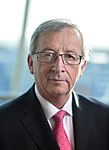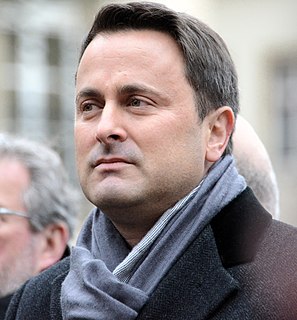| |||||||||||||||||||||||||||||||||||||
All 60 seats of the Chamber of Deputies. 31 seats needed for a majority | |||||||||||||||||||||||||||||||||||||
|---|---|---|---|---|---|---|---|---|---|---|---|---|---|---|---|---|---|---|---|---|---|---|---|---|---|---|---|---|---|---|---|---|---|---|---|---|---|
| |||||||||||||||||||||||||||||||||||||
 Results by conscription | |||||||||||||||||||||||||||||||||||||
| |||||||||||||||||||||||||||||||||||||

 |
|---|
| This article is part of a series on the politics and government of Luxembourg |
| Constitution |
Monarchy |
| Foreign relations |
Early general elections were held in Luxembourg on 20 October 2013. [1] The elections were called after Prime Minister Jean-Claude Juncker, at the time the longest serving head of government in the European Union, announced his resignation over a spy scandal involving the Service de Renseignement de l'Etat (SREL). [2] [3] The review found Juncker deficient in his control over the service. [3]

Luxembourg, officially the Grand Duchy of Luxembourg, is a small landlocked country in western Europe. It is bordered by Belgium to the west and north, Germany to the east, and France to the south. Its capital, Luxembourg City, is one of the three official capitals of the European Union and the seat of the European Court of Justice, the highest judicial authority in the EU. Its culture, people, and languages are highly intertwined with its neighbours, making it essentially a mixture of French and German cultures, as evident by the nation's three official languages: French, German, and the national language, Luxembourgish. The repeated invasions by Germany, especially in World War II, resulted in the country's strong will for mediation between France and Germany and, among other things, led to the foundation of the European Union.

Jean-Claude Juncker is a Luxembourgish politician serving as President of the European Commission since 2014. From 1995 to 2013 he served as the 23rd Prime Minister of Luxembourg; from 1989 to 2009 he was also Minister for Finances.

The European Union (EU) is a political and economic union of 28 member states that are located primarily in Europe. It has an area of 4,475,757 km2 (1,728,099 sq mi) and an estimated population of about 513 million. The EU has developed an internal single market through a standardised system of laws that apply in all member states in those matters, and only those matters, where members have agreed to act as one. EU policies aim to ensure the free movement of people, goods, services and capital within the internal market, enact legislation in justice and home affairs and maintain common policies on trade, agriculture, fisheries and regional development. For travel within the Schengen Area, passport controls have been abolished. A monetary union was established in 1999 and came into full force in 2002 and is composed of 19 EU member states which use the euro currency.
Contents
- Background
- Electoral system
- Parties
- Opinion polls
- Results
- Results by locality
- Government formation
- References
The elections saw Juncker's Christian Social People's Party lose three seats, but remain the largest party in the Chamber of Deputies with 23 of the 60 seats.

The Christian Social People's Party, abbreviated to CSV or PCS, is the largest political party in Luxembourg. The party follows a Christian-democratic ideology and, like most parties in Luxembourg, is strongly pro-European. The CSV is a member of the European People's Party (EPP) and the Centrist Democrat International (CDI).

The Chamber of Deputies, abbreviated to the Chamber, is the unicameral national legislature of Luxembourg. Krautmaart is sometimes used as a metonym for the Chamber, after the square on which the Hôtel de la Chambre is located.


















